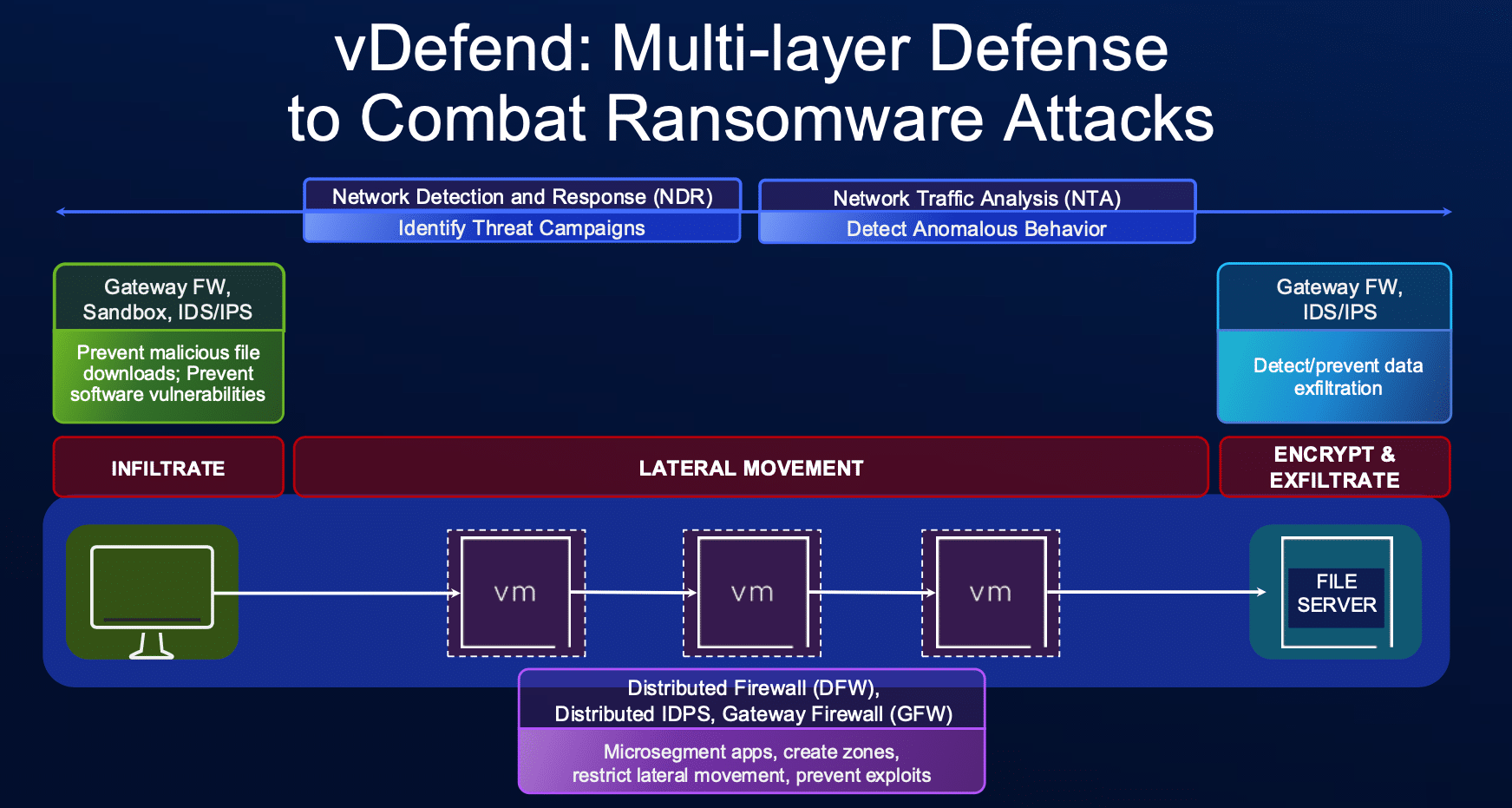Broadcom unveils new enhancements and capabilities to VMware vDefend and VMware Avi Load Balancer at VMware Explore 2024. Enterprises are increasingly pressured to protect applications and data while maintaining optimal performance and scalability. IT teams must quickly deliver services, resolve application issues, provision new applications, and reduce service costs. To address these challenges, Broadcom unveiled new enhancements and capabilities to VMware vDefend and VMware Avi Load Balancer at VMware Explore 2024 in Las Vegas. These updates are designed to transform how organizations protect east-west traffic and automate load balancing in their cloud environments.
VMware vDefend
With the rise of sophisticated threats, particularly those driven by generative AI (GenAI) and large language models (LLMs), traditional security approaches focusing solely on critical assets are no longer sufficient. Enterprises now require a comprehensive, multi-layered lateral security strategy emphasizing zero trust and strict adherence to the principle of least privilege. To meet these demands, VMware vDefend has been strengthened to enhance threat detection, prevention, and overall security operational effectiveness for east-west traffic within VMware Cloud Foundation (VCF) private clouds.

One of the significant enhancements to VMware vDefend is the introduction of Project Cypress, a generative AI-driven co-pilot that accelerates alert triage and remediation. This feature allows security analysts to interact with vDefend through a natural language interface, reducing false positives, decreasing alert volumes, and improving overall threat assessment and response times.
VMware Cloud Foundation 9 integrations have also been introduced to simplify security configurations, allowing seamless incorporation into the VCF ecosystem. Integrating native Virtual Private Cloud (VPC) functionality further enables firewall administrators to define and delegate security policies for self-service operations, streamlining the security management process.
VMware vDefend’s enhanced analytics now include advanced firewall rule analysis, which rapidly identifies and eliminates rules that do not contribute to security effectiveness. This dynamic policy analysis reduces the attack surface by removing overly permissive, ineffective, or redundant rules and ultimately strengthening security.
VMware vDefend now offers file-based and file-less malware prevention capabilities, ensuring compliance with data sovereignty and residency requirements, particularly for organizations in highly regulated industries. These enhancements protect against various malware threats while adhering to strict regulatory standards.
For dense or distributed VCF deployments, VMware vDefend has also improved its Intrusion Detection and Prevention System (IDS/IPS) capabilities. These enhancements deliver consistent threat prevention across multiple implementations, resulting in a 2x to 3x performance boost and increased protection for east-west traffic.
Finally, VMware vDefend leverages the VMware hypervisor as a threat sensor, enabling rapid threat assessment for east-west traffic without additional tools. This capability provides organizations with a powerful, integrated solution for monitoring and mitigating threats within their cloud environments.
VMware Avi Load Balancer
Broadcom introduced VMware Avi Load Balancer enhancements to optimize load balancing for VMware Cloud Foundation (VCF) and Kubernetes environments. The upgrades focus on automation, resilience, and AI-driven operations, ensuring that load balancing remains efficient and scalable across various deployment scenarios.
One of the main updates is the integration of Avi Load Balancer with Tanzu Application Service (TAS). Avi Load Balancer is preferred for TAS, offering end-to-end automation, comprehensive application analytics, and enterprise-grade features at scale. This integration significantly reduces deployment times from weeks to minutes and provides detailed per-application insights from layer 4 to layer 7, improving application management efficiency.
Another significant enhancement is the expanded Gateway API support for Kubernetes. Avi Load Balancer’s support for the Gateway API ensures that Kubernetes-based applications are future-proofed with advanced traffic routing capabilities. These capabilities include header-based matching, traffic weighting, and canary deployments, which are essential for continuous integration and continuous delivery (CI/CD) pipelines. This ensures that applications remain resilient and adaptable to evolving business needs.
Broadcom has also announced planned integrations of Avi Load Balancer with VMware Cloud Foundation 9, offering a unified experience across new and existing workload domains. These planned features include native Virtual Private Cloud (VPC) deployment, VCF multi-tenancy support for self-management per-tenant basis, and multi-availability zone support to enhance resilience. These enhancements will allow enterprises to maintain robust and flexible load-balancing solutions as they scale their operations.
In addition, Avi Load Balancer is set to leverage GenAI technology to create a co-pilot for application visibility. This AI-driven co-pilot will streamline Day 1 and Day 2 load-balancing operations for VCF workloads. It will provide recommendations on product documentation, configuration guides, and best practices, enabling more efficient management and optimization of load-balancing tasks.
Finally, Avi Load Balancer is set to achieve next-generation scale and performance improvements, thanks to the support of Intel QuickAssist Technology (QAT). This enhancement delivers over 3x improvement in secure sockets layer (SSL) performance and planned scale increases of 1.5x to 5x, supporting ongoing application scaling and ensuring that enterprises can meet growing demands without compromising performance.
Engage with StorageReview
Newsletter | YouTube | Podcast iTunes/Spotify | Instagram | Twitter | TikTok | RSS Feed
